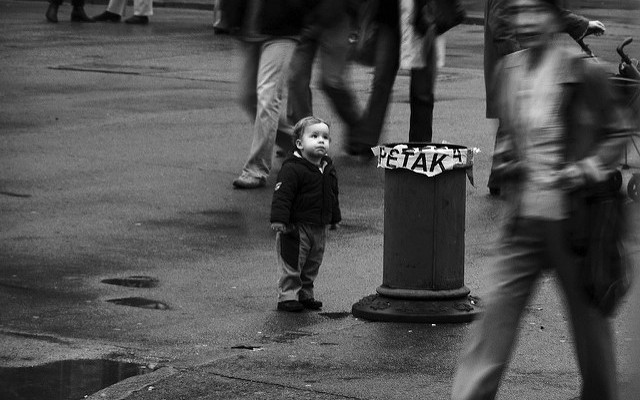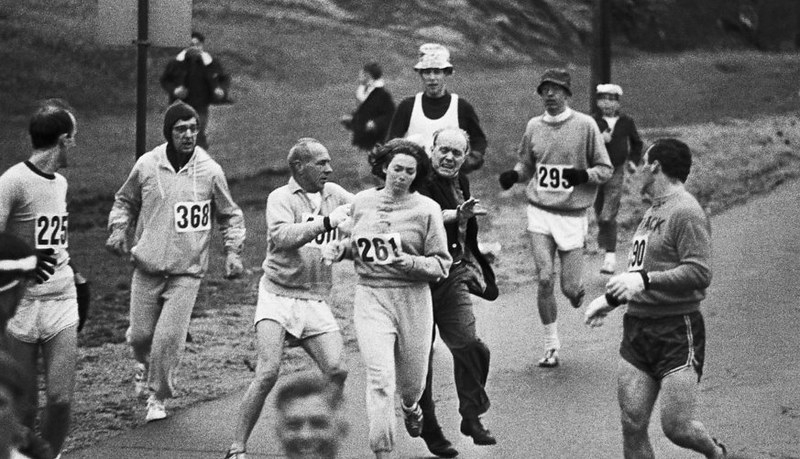For obvious reasons, motherhood has long been a topic of interest within feminism, and, at times, of pointed and passionate disinterest. Recently, in the Sydney Morning Herald, Dilvin Yasa sparked conversation about the extreme difficulty of motherhood and the taboos forbidding mothers to admit regret about the role. As Amy Gray has pointed out, there is an important distinction to be made between the socially constructed role of motherhood and a woman’s relationship with and feelings towards her children: ‘When a woman tells you she regrets becoming a mother, she’s not telling you she dislikes her children. She’s telling you she dislikes the job.’ This is a distinction that we would do well to recall in discussions about childbearing, motherhood and reproductive rights within feminist discourse more generally, as well as when we are discussing and listening to the personal experiences of mothers.
‘Give me a kiss!’
‘I don’t want to.’
‘What? Yes you do! Come here, give me a hug, or I’ll chase you and give you one myself!’
My son, Oscar, is three. He is articulate and perfectly able to understand plain English, but people are constantly talking about him, in his presence, as if he’s not there. Many of my friends are self-described fierce feminists, who can and do rant indefinitely about the indignity women suffer by being silenced, ignored, objectified and dismissed, and yet they consistently do all of these things to Oscar. They ignore his requests not to be touched or embraced, and never make what is to me the very obvious connection between this and their own feminist positions about the non-negotiable need for consent. They override his very clear statements about his emotions; they even laugh when he’s upset and say, in his hearing, that his anger is ‘cute’.
None of these people are purposefully cruel, nor is their approach to interacting with children unusual. What has often perplexed me, though, is how often this kind of behaviour is exhibited by people who are so involved with and driven by feminism, which is so heavily grounded on assertions of dignity, autonomy and respect. What I’ve come to suspect is that many feminists’ failure to recognise the autonomy of children is, at least in part, symptomatic of the way children have for many feminists become symbols of oppression. But when we are unable to separate the systematic discrimination that makes mothering a ridiculously difficult and often oppressive role from the fact that children are sentient, autonomous human beings who deserve dignity and respect, we are in danger of allowing glaring hypocrisies to creep into the way we construct and use feminist principles and ideas.
‘He’s so cute. What’s his name?’
‘Rumpold.’
‘How old is he?’
‘Just over two.’
‘Still a pup! Hello, Rumpold.’ I reach out to let him sniff my hand. ‘He’s beautiful.’ I ruffle his fur.
We talk a lot, in discourses regarding and informed by feminism, about the fact that women should be able to exist in public spaces without being approached by strangers who comment on our appearance; without being touched by people who don’t have our permission, but who feel entitled to touch us because they like the way we look. Oscar gets more unsolicited comments about how cute he is, more uninvited pinches on the cheek and ruffles of the hair and demands for affection from strangers, than anyone else I know. I made a point, from when he was very young, of teaching him to express his discomfort: he says ‘I want some space’; he says ‘I feel shy’; he says ‘I don’t want you to touch me’; he says ‘I don’t like that, please stop.’ These statements from him are almost always laughed at, and then ignored, until I step in on his behalf.
‘He’s very cute. What’s his name?’
‘Oscar.’
‘How old is he?’
‘Three.’
‘Hello Oscar! You’re three!’ The woman leans across the tram seat to ruffle his hair. He ducks his head, hides behind my arm.
‘Shy,’ he says.
‘Gorgeous,’ she tells me. Reaches down to pinch his cheek.
It doesn’t help, when it comes to trying to get people to respect the consent and emotions of children, that in the assertions we make about our reproductive rights our discourse frequently descends into comments like ‘kids are gross’ or ‘I just really hate children’. There is something about making these kinds of blunt statements as a person with a uterus that feels liberating – and I get it, because I used to say similar things myself. I would relish the shock of conservative people listening. I think the time of this kind of statement being radical or shocking is past, but I also think that these sorts of comments distinctly lack respect for the inherent human dignity of very young people. These statements are commonplace enough in feminist circles for calling them out to feel strange; and yet they’re inherently dehumanising and objectifying, which to my mind makes them blatantly out of step with everything feminism should be.
I by no means believe that women need or ought to have loving or maternal feelings towards children. The gendered onus put on women to be nurturing, maternal and selfless is inherently oppressive, and I applaud every person who knows and articulates what they do and don’t want to have happen to their bodies and their uteruses. But the recognition of the structural oppression of people with uteruses is not incompatible with children being recognised and treated as autonomous, individual people. We can and must voice our concerns about reproductive rights, and the often oppressive role of motherhood, without these concerns somehow being twisted to validate the disrespect and oppression of actual children.
What do we mean when we say that kids are gross? Do we mean that cleaning up shit is gross? Do we mean snot is gross if it doesn’t stay out of sight? Maybe the mess that comes with a person learning to use their own body to feed themselves, that’s what we find gross? None of these things are exclusively associated with children. Moreover, making blanket statements about an entire demographic of people – saying that they disgust us – is not tolerated, nor is it considered particularly intelligent or kind, if made about any group other than children. But when people say things like this about kids, no one seems to bat an eye. Is this because we’re confused, en masse, about the sentience of children? About how much they see and hear and understand?
A few months ago, I had a large-ish group of people around for dinner at my apartment. I do this pretty regularly; it’s a good way for me, a single parent who very rarely has evenings free for socialising with other adults, to catch up with a lot of people at once. At some point or another during these evenings, Oscar will take himself into his room for a while, to get away from the loud and irrelevant adult conversations taking place in the main rooms. At this particular dinner a few months ago, when I went to check on him he seemed flatter than sheer tiredness warranted. I asked if he was okay, and he said, ‘My hands are small and not very good at holding berries. Those big friends were laughing at me when I was trying to eat and I felt shy,’ and then he burst into tears.
This is a pretty standard kind of situation, one that most parents will be familiar with. And it’s easy to dismiss – children get tired, become sensitive, worse things happen. But I bring it up because it is evidence of some of the ways we grossly underestimate the emotional intelligence, sentience and autonomy of children.
For my friends without children (which is most of my friends), parenting is very ‘other’ as an idea and an experience, and Oscar can consequently become a phenomenon to observe and comment on and laugh at, rather than an individual person with feelings. Many of the discussions I have about parenting with other young people, especially with other women, are about the role of motherhood and the ways it disadvantages me in terms of my career, my studies, my social life. These are important discussions. But while obviously intrinsically connected to the fact that I am a mother, my child is a separate person in his own right and not simply a by-product of my motherhood.
That night, I tried to explain to Os that sometimes big people forget that they are often very messy eaters themselves; that sometimes they talk about people instead of to them, and are rude by accident, just like children can be. I told him I was sorry that he’d felt uncomfortable and that I’d talk to the big people. I brushed his teeth and tucked him into bed, and returned to the wine-fuelled conversations about sexism in the street, racism at work, identity politics; the palpable catharsis in the next room. People saying ‘this happened,’ people saying ‘I felt this,’ people saying ‘I don’t want this’, and everyone else in the room listening and believing them. I let myself feel proud that my home is, for some people, a safe and receptive space in which to articulate the experiences they have navigating the world in their inherently politicised bodies.
It should always be that kind of space for Oscar too; spaces (and discourses) claiming to be feminist should be spaces where the autonomy, consent and dignity of all people are upheld and respected. I’m not suggesting that every place frequented by adults ought to be child-friendly, nor am I trying to suggest that there is no distinction to be made between children and adults. But I am suggesting that every place that children enter should be a place where they are respected as people. The idea that children are individual human beings should not feel like a radical notion – especially not for feminists.
Image: Petak / Zorislav Stojanovic






